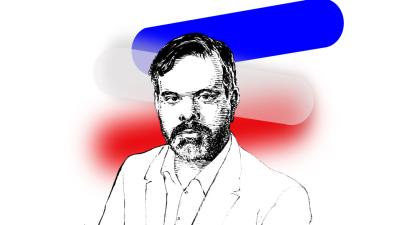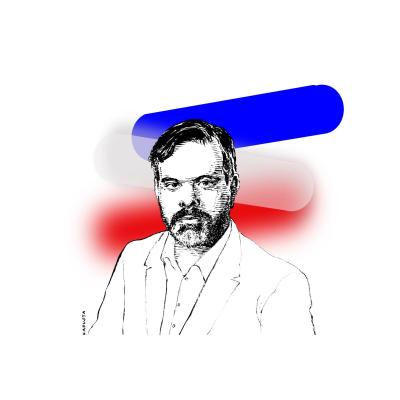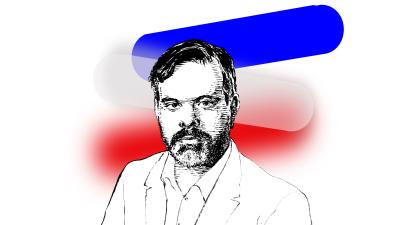We underestimate the determination of the KGBists in power in Moscow to take revenge on the West so much that we refuse to see their attack on our southern flank. Through their indifference, incompetence, corruption and/or intoxication, Western politicians, intelligence services and diplomats either failed, or did not want, to see that for 20 years those old Cold War soldiers had been preparing a confrontation with us. For Putin, it's a question of the survival of his regime and the Russian empire. The Ukrainians have given us another year and a half to prepare, and what have we done with it? Let's be frank: virtually nothing. Worse still, faced with the results of their impotent inaction, the Western elites are beginning to back down, accusing their population of "being tired of war", when in fact it is the Ukrainians who are waging it.
I was invited to speak on Russian influence at the Karpacz Forum (Central Europe's biggest gathering of over 5,000 academics, economic and political decision-makers), and at a small dinner I had the opportunity to take part in an exchange with a former German foreign minister. He explained to the table that the solution to all our problems in general, and to continental defence against Russia in particular, was to set up new European structures. I took the liberty of reminding him of the urgency of the situation, because such structures would take at least 5 years to set up and become effective. Above all, the German government's strategy of controlling the European bodies so that they serve its mercantilist and energy policies, in particular via the CDU, SPD and Green foundations and their galaxy of NGOs, made me fear the worst. We may have created a superstructure like the EU, but that didn't stop Germany from opening its borders during the Syrian crisis against an overwhelming majority of EU member countries, in particular to respond to the labour shortage that was jeopardising its industrial growth. Nor did the EU prevent Germany from building the Nord Stream I and II gas pipelines with Russia, in contravention of European legislation and Europe's energy interests, and against the advice of the Scandinavian countries and Eastern countries of the EU. And all so that its industry could benefit from cheaper energy. Germany has also done everything possible to sabotage the French nuclear power, which was the main competitive advantage of French industry, in particular through European regulations. It also abandoned France at the worst possible time on the military aircraft and tank programmes of the future. So now that Berlin is faced with the bankruptcy of its energy and mercantilist policies and is sinking into an economic slump, what guarantee do we have that Berlin will not, once again, go for it alone and break European unity over the support for Ukraine in order to save its industrialists, squeezed by the cost of energy and the flagging Chinese economy? Clearly very annoyed by what I was saying, the former minister looked me straight in the eye and said with a sardonic smile: "And what about France, it's doing badly in Africa, isn’t it?" I replied that this was pretty low-quality 'whataboutism'. The conversation ended there. But other conversations led me to realise that France's current failure in Africa at worst pleases our European partners, who see in it a certain revenge for our arrogance on the subject, and at best is completely indifferent to them. None of them understands that part of our conflict with Moscow is being played out there.
The misunderstanding of our European partners is understandable. If we look at the current events in Africa, we can be impressed by the sovereignist movement of young Africans rebelling against the French influence. The images of demonstrations calling on France to "get out" are powerful, and the anti-French propaganda of many of the African state media is deafening. But if you look at the figures, it's hard to understand how these populations could be so politicised. In Niger, for example, the average age is 15, and only 37% of the population is literate. According to several journalists who have investigated things on the ground, the Russian mercenary group Wagner pays many of these demonstrators and offers remuneration to local journalists. You also have to realise that in the Sahel precariousness is everyone's daily lot. A flood or a storm can turn everything upside down. Under these conditions, the French presence is far from being the main concern of the people. And yet, in the region where there are major inter-ethnic tensions and extreme poverty, France provided a minimum of stability. It is now almost 3 generations since France decolonised the region, and yet the leaders of these countries have never ceased to point the finger at Paris as being responsible for all their misfortunes and failures. What is more, it is the most educated young people in the towns who have been the most exposed to this propaganda via school and the media. They are to be found at demonstrations and sometimes even in government. It is also true that French economic interests have been able to develop well in their country, even if this is very relative since Burkina, Niger and Mali represent between 0.1 and 0.2% of French foreign trade. On the other hand, the French, who have welcomed large numbers of citizens from these countries, do not understand such hatred towards them. A certain bitter lassitude has also developed between Paris and its former colonies, given the mutual incomprehension and the major cultural differences between African Muslim countries and the secular European republic giving them lessons on gender and democracy. Russia and Algeria have taken advantage of these divisions to destabilise those countries, promote the rise to power of military officers close to them, exclude France from the Sahel and thus control all the main migration corridors.
Few observers point this out, but in reality Algeria now has more influence over its former metropolis than vice versa. Firstly, through its large diaspora in France it can control certain migratory corridors and gas. But Algiers has built up a veritable state hatred of Paris, which is now propagated in its schools and media. Lately, Algiers has even started playing the anti-France verse from its national anthem at official ceremonies: "O France! The time for palaver is over. We have closed it like a book. O France! The day has come for you to be called to account. Prepare yourself! This is our answer. Our revolution will deliver the verdict. For we have decided that Algeria will live. Bear witness! Witness for yourself! Be the witness! After the reintroduction of this verse, Algerian President Abdelmadjid Tebboune declared at the St Petersburg economic forum that Putin "was a friend of humanity". Above all, Algiers is very active in French-speaking Africa. It spreads intense propaganda against France there, accusing the African countries of ECOWAS (Economic Community of West African States) wanting to intervene in Niger of being puppets of Paris who are plundering Africans. The anti-French propaganda broadcast by Algiers media throughout Africa is currently reaching a fever pitch. What's more, it has long since infiltrated the jihadist groups operating in the Sahel and destabilising the entire sub-region. Since early August, tensions have been rising in northern Mali, which borders on Algeria. The Coordination des Mouvements de l'Azawad (a rebel group opposed to the central Malian government) has accused the Wagner group and the pro-Russian Malian government of breaking ceasefire agreements. Now that the French army has left, a confrontation between the rebels and the central government would allow the jihadist movements to return to the scene and inflame the whole region, which would push even more migrants to leave.
Algiers and Moscow are firing up the people, and the aim seems to be for all these countries to fall like dominoes. And it's working: Burkina, Niger and Mali are now pro-Russian regimes, no doubt about it. The method is always the same: "spontaneous" demonstrations emerge and young soldiers, often presidential guards, take power from those they were supposed to protect. Simple, cheap and effective. The names of their governments - Comité national pour le salut du peuple (Mali), Conseil national pour la sauvegarde de la patrie (Niger), Mouvement patriotique pour la sauvegarde et la restauration (Burkina Faso) - smack of the Cold War and the independence movements controlled by Soviet Russia at that time.
Admittedly, these are the outermost countries with virtually no weight. But they are the main corridors for migration from Africa to Europe, which in turn lead to Algeria, Libya (Russia's two main allies on the continent) and Tunisia, whose democracy is so young and therefore fragile that its destabilisation is to be feared. Russia, with its allies, controls nearly 70% of the African migration corridors to Europe. With that alone, and knowing how little regard Russia has for the lives of its own citizens, we should start to be particularly worried. It went unnoticed by the Western media, but in September, during the record influx of migrants to Lampedusa, Russian Deputy Defence Minister Yunus-Bek Yevkurov visited the main African leaders controlling the migratory corridors several times. Note that Yevkurov, the former leader of the Muslim-majority Russian republic of Ingushetia, was shown in a video sitting with Prigozhin in a courtyard when Prigozhin took over the military headquarters in Rostov-on-Don during his rebellion in June. At the end of August/beginning of September, he met the leaders of Libya, Burkina Faso and Mali. And in mid-September, he returned, notably to Mali to meet the leader and his defence minister, as well as that of Niger, who was there for the signing of the Alliance of Sahel States (AES). The AES is a military alliance between the 3 pro-Russian states of Burkina Faso, Mali and Niger in the Sahel region, who are demanding that France leave the area and are spreading hateful anti-French propaganda. On each occasion, the Russian deputy minister was accompanied by the GRU (Russian military intelligence service) general Andrey Averyanov, in charge of planning and organising intelligence operations, including destabilisation and sabotage actions. At the same time, General Surovikin, former commander of the aerospace forces and former commander in charge of military operations in Ukraine (who, according to the Western press, had fallen from grace because of his proximity to Prigozhin) was in Algeria and possibly Libya. Surovikin is also renowned for his organisational and planning skills. Some will say that it was to ensure Prigozhin's succession, but replacing the head of a company of a few hundred mercenaries in Africa does not require such a deployment of high-level dignitaries coming in so frequently.
There is little doubt that the Lampedusa operation was coordinated, organised and planned. The arrival of more than 150 boats at the same time, almost all of them men (around 8,000 of a dozen different nationalities), followed by a second (smaller) wave of mixed boats with women and children, is a quasi-military operation that cannot be mounted by simple human traffickers. According to many media reports, the weather was first bad in the Mediterranean and when it cleared up, everyone went through at the same time. But this wasn't the first time there'd been bad weather in the Mediterranean, yet it's the first time there was such an influx. Normally, when there is a sudden surge in requests for passage, traffickers take advantage of this to raise their prices, but in this case, according to many witnesses, passage was exceptionally free. Some believe that this is because the Tunisian government wants to put pressure on Italy and the EU to obtain more compensation. If this is true, it would mean that the Tunisian government is working hand in hand with human traffickers and is therefore a criminal state. In any case, everyone agrees that Tunisia is currently overwhelmed by migrants and that the other "spots", especially Morocco (an ally of the United States), are less active. And who are Tunisia's two neighbours through which any migrant wishing to reach the country has to pass? Algeria and Libya, Russia's two main African allies.
We could reassure ourselves by saying that it's the natural course of events: with the increase in the African population, immigration increases. Perhaps, but the African population has not doubled in 9 months, while migrants transiting through Lampedusa have increased from 60,000 to more than 120,000 on this small island of 6,000 inhabitants. What's more, according to testimonies filmed by people close to Éric Zemmour (who cannot be suspected of "Russophobia" or of wanting to promote the Ukrainian cause) present in Lampedusa, migrants from Burkina Faso said that they had decided to migrate to France because the military regime's TV had not stopped promoting welfare benefits in France.
As I have been saying for more than a year, the Russian empire, in its headlong rush forward, cannot be content to stagnate in Ukraine, on our eastern flank - it is a question of survival. To break this stagnation, Russia must open up a new front. Moscow is waging a hybrid war on our southern flank, and this is becoming increasingly obvious. It is now in a position to control the African migration corridors and trigger migration waves in the Mediterranean. The attacks on the Polish border by Belarus, using migrants in 2021, showed us that this is not a science fiction scenario. We need to wake up at last! The time for complacency is over. Putin is going to use every possible means to destabilise us, and the chaos triggered by mass arrivals of migrants is the easiest thing to put in place, one most painless for Russia and at the same time the most effective. Especially as the parties that will benefit most politically are precisely the most pro-Russian ones, those that Moscow has been infiltrating for 20 years from the bottom up.
We need to act quickly, because if we don't, with states that only understand the balance of power, the situation can only get worse. The next step will be for Russia to influence gas and oil prices with Algeria and Libya. A military intervention by France to return to the Sahel countries would surely be the worst thing of all. If France re-established the power of elected leaders, the latter would lose all legitimacy in the eyes of their people. Our soldiers would be faced with riots organised by the Russians, and that would become an unmitigated quagmire for us. However, we must be inflexible, and the whole of the EU must put pressure on the African countries that are letting migrants through. According to the statistics, at least 80% of them are not refugees, for they are not in danger in the countries they are leaving. Most of them have already applied for entry but have been refused. Almost all the illegal migrants who set foot on the European continent will not be deported. We define the conditions for entry into Europe by law, but these people blithely flout them and we do nothing. This is a flagrant and massive violation of the rule of law. Many of our elites will tell you that it is impossible to control migratory flows. The fact is that if you start out as a loser, there's no chance of winning. We need to take a leaf out of the book of countries that have managed to control their migratory flows.
First of all, they have sent a clear message to the whole world: we don't want illegal migrants and we will do everything in our power not to have any. Do we? No. Is it complicated to do? No. Secondly, they have introduced rules for admitting migrants on the basis of merit (for example, granting aid only to migrants who have entered legally), particularly through getting a job. Finally, they have taken draconian measures that demonstrate their unwavering determination. And it's working: for example, there are no longer any drownings of migrants trying to enter Australia. We need to send a fleet of civilian ships to get as close as possible to the coasts of the countries from which the migrants are leaving, recover the migrants at sea to prevent them from drowning and then, as required by international law, bring them back safely to the nearest coast, i.e. Tunisia or even Libya, and not to Europe as we are doing at present. This is what Australia has successfully done with its "Turnback Operations". If necessary, we will have to stop the flow of money to countries that refuse to cooperate and mistreat the migrants they have allowed to enter their territory. If such a measure were taken at European level, no African leader would resist it, for fear of his own assets in Europe and a revolution among his compatriots who live off European remittances.
France must alert the EU and take the lead as soon as possible in defending the southern flank, as Poland has done for the east. By its action and example, Poland has shown the way for other Member States to follow. Finally, France alone can declare that it will refuse all illegal immigrants and that it is ready to help any European country, such as Italy, to apply this policy on the ground. We also urgently need reconciliation with Morocco, which is Algeria's great rival and the only counterweight on the continent. Withdraw from Niger and implement a policy of containment of the pro-Russian countries with our African allies, offer them a real Marshall Plan and reposition all our forces to support them and fight the Wagner terrorist organisation militarily.
Read also
Country Report: A Surreal France, March 2023
The main news in France during the month of March was of course the demonstrations against the pension reform. These overshadowed a fairly large number of surreal news items, each of which would deserve a thorough analysis, as they are so symptomatic of the flaws in the French society.
Patrick Edery
What dangers hide behind AI and ChatGPT?
A decade ago we were told that manual jobs would disappear and that only professions with a strong creative or intellectual character would remain. But with the revolution in Artificial Intelligence (AI), such as ChatGPT or Mid-journey, it seems that journalists, lawyers, computer scientists, analysts, doctors, cartoonists, webmasters, actors, authors, scriptwriters and artists are also likely to disappear en masse.
Patrick Edery
The Worrying State of Pluralism in the French Media
The French press likes to give lessons on democracy, European values and the rule of law. Yet France is certainly one of the democracies where the lack of pluralism, the almost totalitarian unanimity of the media, is most worrying. French journalists are very concerned about press freedom in Poland, but in that country, 2/3 of the mass media are against the government and fire red-hot bullets at it every day.












Comments (0)